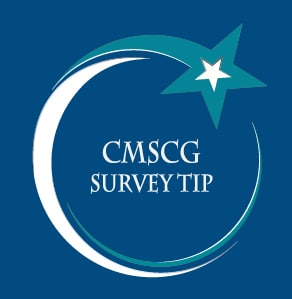On March 10, 2022, the Centers for Medicare and Medicaid Services (CMS) issued a revision to QSO-20-38-NH, “Interim Final Rule (IFC), CMS-3401-IFC, Additional Policy and Regulatory Revisions to the COVID-19 Public Health Emergency related to Long-Term Care (LTC) Facility Testing Requirements.” That IFC, initially posted in August of 2020, established F886 COVID-19 Testing – Residents and Staff. CMS revised F886 in September 2021, and here we are again with revisions to F886. Last week on the CMSCG Blog, we had started looking at med errors, but will review the updates to F886 before we move to the next part of our post for F759 Free of Medication Error Rates 5% or Greater.
F886 – What’s New
In line with the Center for Disease Control’s recent language related to vaccination status, CMS has added the definition for “up to date” to F886. This means that an individual has received all recommended COVID-19 vaccines, including any booster dose(s) when eligible to receive them. Initially, you might think that if someone was up to date with their vaccinations, they may be excused from some of the COVID-19 testing, right? Well, according to the updated Testing Trigger Summary . . . not exactly. Instead, sprinkled throughout the regulation is a new phrase: “regardless of vaccination status.” Let’s look at what it means.
“Up to Date” now means that an individual has received all recommended COVID-19 vaccines, including any booster dose(s) when eligible to receive them.
Testing Summary
- If a symptomatic individual is identified, ”regardless of vaccination status” staff and residents with signs or symptoms must be tested.
- If a newly identified COVID+ staff or resident in the facility can identify close contacts, “regardless of vaccination status,” all staff with a higher-risk exposure to the individual and all residents that had close contact with the individual should be tested.
- If a newly identified COVID+ staff or resident in the facility cannot identify close contacts, “regardless of vaccination status,” all staff and all residents should be tested at either a facility-wide or group-level.
If a staff member who is not up to date refuses testing when outbreak testing has been triggered, the individual should be restricted from the building until the outbreak testing procedures have been completed. The QSO Memo states that the facility should follow local jurisdiction/ occupational health policies regarding asymptomatic staff who are not up to date with their COVID-19 vaccine shots/boosters and who refuse testing.

The revised QSO Memo includes two tables for your reference about who needs to be tested when there’s an outbreak and who does – or doesn’t need to be tested routinely. Make sure you’re using the current version!
Routine Testing Updates
Although the guidance hasn’t changed much as far as the testing triggers go, when it comes to routine testing, this is when some difference will occur. The community transmission level is still expected to be used to determine staff testing frequency, however, now there is a difference in testing requirements for “up to date” staff versus those who are not up to date.
- Staff who are up to date do not have to be routinely testing.
- Staff who are not up to date should be routinely tested based on the community transmission level.
- For low levels of community transmission, routine testing of staff is not recommended.
- For moderate community transmission, the testing frequency is once a week.
- For substantial or high levels of community transmission, the testing frequency is twice per week.
View the revised QSO Memo here.